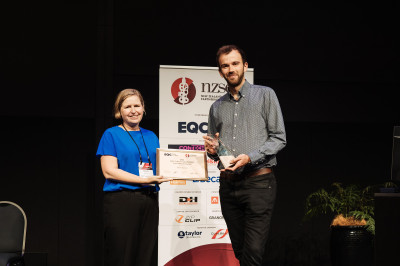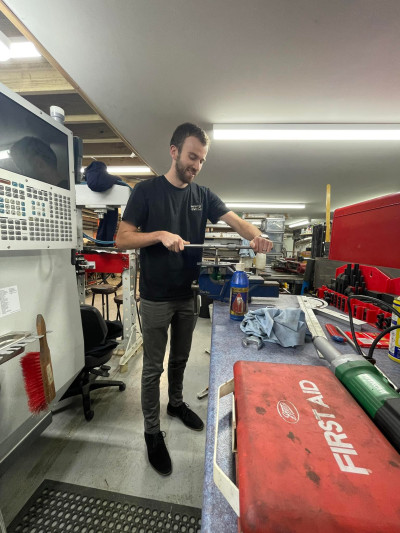Ivan Skinner Award winner inspired by real-life earthquake experience
Witnessing the human cost of the Canterbury earthquakes inspired Ben Exton to become an earthquake engineer and find solutions to make New Zealand homes more resilient against future seismic events.
Exton last week received the Ivan Skinner Award at the New Zealand Society of Earthquake Engineers (NZSEE) annual conference to recognise his innovative work as a practitioner and to support his quest to develop and commercialise cost-effective engineering solutions.

Ben Exton receives the Ivan Skinner Award from EQC's Natalie Balfour at the NZSEE conference
“What I remember from the Canterbury earthquakes was the enormous damage, but also the incredible human impact,” says Exton, who spent many days as a Year 12 student at Riccarton High School cleaning up liquefaction from properties in what has since become the Residential Red Zone.
“I particularly recall my great-uncle, who was a keen gardener, and his beloved garden was completely covered in liquefaction. Watching a stoic Kiwi bloke like him totally devastated and helpless against the effects of an earthquake made a huge impact on me,” says the now 29-year-old CEO and co-founder of Seismic Shift Limited.
Exton is the first engineer outside of academia to receive the Ivan Skinner Award, which is funded by EQC Toka Tū Ake.
“Receiving this award is really encouraging for me, but I hope also for others in the private sector seeking to make the world a better place through innovation,” says the Christchurch engineer who emphasises that research and practical experience both play a crucial role to create innovation.
“It is important to test new ideas in the laboratory for scientific grounding, and then turn these ideas into real-life solutions that are cost-effective and fit the current building environment.”
Caleb Dunne, Principal Advisor Risk Reduction and Resilience at EQC, says the NZSEE wanted to recognise more practitioners outside traditional researchers.
“The judging panel wanted to acknowledge his unconventional career path, as a practicing engineer and entrepreneur in this space. He has an intense passion in his work and looks for innovative ways to improve the built environment for the people it serves,” says Dunne.
After finishing his degree at the University of Canterbury, Exton cut his engineering teeth at Structex and further expanded his skills at Building Revolutions Group and Maynard Marks, before starting co-founding a firm with fellow engineer Geoff Banks.
“I’ve been extremely lucky that my previous employers allowed me the freedom and time as a young practitioner to think creatively and explore new ideas and I really wish other firms can be just as generous with their young talents coming through,” says Exton, whose wife Miki, with her architectural background, provides the perfect foil to explore new ideas.

Ben Exton working on new innovations in his workshop
The company is currently in the process of commercialising a low-cost base dissipation system for residential homes, that rapidly developed from a 3am sketch to a feasible engineering innovation.
“I had this picture forming in my head at 3am, so I sketched it and then decided to get the design printed in 3D. We didn’t have too much confidence in the sketch on paper, but when Miki and I put the 3D pieces together, it actually worked!”
The Ivan Skinner Award winner explains that he will use the prizemoney for professional development, and to research state-of-the-art steel coatings from the aerospace industry to apply in resilient seismic engineering solutions.
“This is a cool example how well connected we all are in New Zealand. A mutual friend connected me with a coatings company, because he thought we would both benefit from working together.
“Both companies receive incredible support from Callaghan Innovation and working together further multiplies the impact of that support.”
Exton says that he and Banks seek to develop low-cost solutions that are easy to replicate and don’t require any major changes in existing engineering practice.
“Our vision is to make resilient earthquake systems in homes as ubiquitous as seatbelts are in cars.”
Watch Ben discuss some of his innovative earthquake technology, and how the Ivan Skinner Award will support its further development: